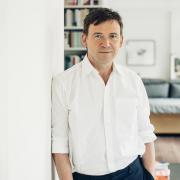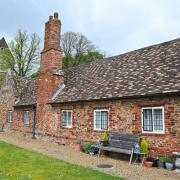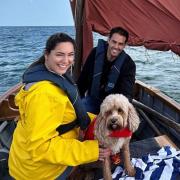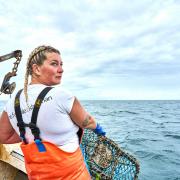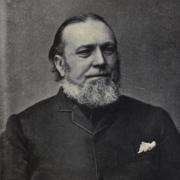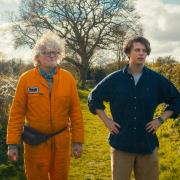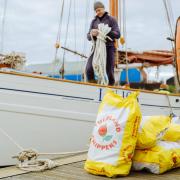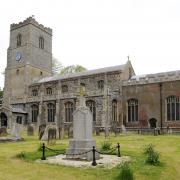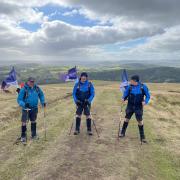Food historian Annie Gray is a familiar face on our TV screens thanks to appearances on shows including The Great British Bake Off, The Sweetmakers and Victorian Bakers and is resident historian on Radio 4's The Kitchen Cabinet. Her books include Victory in the Kitchen: The Life of Churchill's Cook, The Greedy Queen: Eating With Victoria and the official cookbooks for the hit shows Downton Abbey and Call The Midwife.
She grew up just outside Norwich and now lives in Cambridgeshire.
Annie will be talking about her latest book, The Bookshop, The Draper, The Candlestick Maker: A History of the High Street when she appears at Mannington Book Bash this month.
Please tell us about your new book...
The idea for this book came out of lockdown. I found myself getting increasingly annoyed at the combination of people lamenting the death of the high street, while simultaneously shopping via online companies with no high street presence, or mindlessly queuing for hours at supermarkets. I've studied the history of food for a long time now, including that of procurement, and a lot of the things I heard were just plain wrong. I went to read up on it - and discovered there really wasn't much out there, especially anything aimed at a popular market. So I decided to write one.
Where did your research take you? And were there any particularly interesting discoveries that you made?
Gosh, all sorts of places. All my previous books have been centred on food, though two of them were biographies, so covered a lot more than just cooking and eating. This - of course - has a lot of food in it, for in every chapter I take the reader on a shopping trip, some of which is for food - and we also stop for drinks and food on the way. But it also goes way beyond that. Even the tiniest of things were fascinating - the fact that early shops sold through an open window, not inviting people in, or that ready-to-wear clothing only really got going after the First World War. I always write using as many first person stories as I can, and unearthing the words of past shopkeepers as well as their customers was incredibly rewarding - whether it was a grocer annoyed at his inept nephew accidentally blowing up his shop, or a young boy choosing his first suit. I want to make sure readers can really situate themselves in time, so I've included a series of short vignettes - a walk down specific high streets at a specific point in time. Norwich in 1869 is one of them, so now I have a pretty in depth knowledge of exactly what Gentleman's Walk would have been like for a mid-Victorian shopper.

You had the whole world on Gentleman's Walk in 1869, and while many of the buildings are still there, none of the shops survive with the exception of Jarrolds, at the time a bookseller and printer rather than the department store it is now. There were a couple of not-yet-department stores - at the time large drapers' shops - up Gaol Hill. The market square was smaller, and had a neoclassical fish market, and on the side looking onto it you could buy everything from pianos to lawnmowers, boots and 'fancy goods' which were the 19th century equivalent of a bouji gift shop. Lots of grocers, upmarket ones, tea dealers, china sellers, book shops and linen shops - but also an agent for fishing tackle The upper floors were residential - mainly lived in by shop assistants.
What sparked your interest in the history of food?
I've always been interested in cooking - but I really got into it when I lived in France for a few years as a teenager, My dad worked for Nestlé in Norwich, and when they closed the factory he was lucky enough to be moved to a research position there for a bit - so I went with him. It stayed a hobby until I did a masters in historical archaeology at the University of York - it's very much about material culture and lives as lived. It was a complete contrast to my undergrad degree, which was in modern history, and - for me - too centred on politics and the lives of the rich. Then I'd spent a few years getting sacked a lot, and I was doing the MA to refocus, and because I'd realised I really wanted to work in public history. One of the elements of my MA course involved the introduction of chocolate to Britain. I recreated a recipe from 1651 - another advantage of my dad's link to chocolate and it went down so well that it basically sparked off my career. I did a PhD, and said yes to everything offered to me, and now, 15 years later, here I am.
What is your favourite gastronomic era and why?
That's a hard one. If forced to choose, I'd go 18th century, because the flavours are just far removed from today that they are really interesting, and just close enough not to be too challenging. It was an era of massive innovation, both agriculturally and industrially. But it is also fascinating from a social history point of view - it's a dark time in British history for we were still active in the slave trade, and while many of what we now think of as classic British dishes were developed, they were based on exploitation and human suffering. It's a real time of contrast.
How often do you come back to Norfolk and where are your favourite places?
I'm only a few miles from the border, and I have friends or family in various bits of Norfolk, so I'm there quite a lot. I love the north Norfolk coast, at least outside the summer, when it is insane, for walking and fish and chips, as well as the pubs, though I'm more often to be found in the King's Arms in Shouldham because one of my best friends lives there - and it's a great, community owned pub. I always enjoy the selection of restaurants in Norwich, as well - the amazing Japanese place, Shiki, and L'Hexagone are some of my favourites - and the market, obviously, is iconic. Produce-wise, I'll go a long way for Brancaster mussels, brown shrimp and samphire - plus a good Cromer crab. There are some incredible small producers in Norfolk as well. Eastgate Larder makes the best medlar chutney I have ever eaten (best chutney full stop, I'll be fair), while [just over the border in Suffolk] Hodmedods have helped make beans cool again. Then there's Mrs Temples cheese, the Fruit Pig Company... I'll stop now! I'm a panellist on Radio 4's The Kitchen Cabinet, so I've been lucky enough to sample a lot of good Norfolk produce whenever we've done a show in the county..
What are your favourite dishes from history that you've recreated?
These fall into two camps: the silly or spectacular, of which stuffing a pig's head to look like a boar wins hands-down; and those that are just good, and therefore enter my regular repertoire. I have a habit of putting those ones into the cookery books I write - which have all been tie-ins with TV shows or the English Heritage The Victorian Way YouTube feed. The only one I've not got into print yet is a gorgeous sausage and chestnut casserole from the 1850s - but watch this space. If I had to pick two things to bring back (the answer would change every time you asked me) - currently I'd pick moulded 'shape' - essentially fruit blancmange - from the 1930s - and a really good savoury suet pudding - pork and quince, maybe, or veal, ham and mushroom.
The Bookshop, The Draper, The Candlestick Maker: A History of the High Street by Annie Gray is published by Profile
Mannington Book Bash is being held at Mannington Hall from Friday October 4-Sunday October 6. Annie will be appearing on the Sunday at 11am.

The full Mannington Book Bash line-up is:
Friday October 4
Sam Leith - The Haunted Wood
Robert MacFarlane (with Patrick Barkham) - The World To Come
Saturday October 5
Chris Riddell in conversation
Marchelle Farrell & Tessa McWatt
Helen Fry - Why I Became an X-Troop Commando
David Nicholls - You Are Here
Hollie McNish - Lobster
Sunday October 6
Kathryn Faulke - Every Kind of People: A Journey into the Heart of Care Work
Annie Gray - The Bookshop, The Draper, The Candlestick Maker: A History of the High Street
Ned Palmer - A Cheesemonger's Tour de France
Naomi Wood & Lucy Caldwell - The Art of the Short Story
Harriet Walter - She Speaks!
Full weekend passes, day tickets and individual event tickets are available. Go to manningtonbookbash.co.uk





